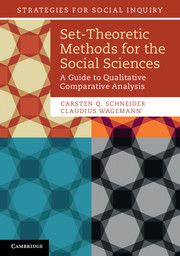Book contents
- Frontmatter
- Contents
- Figures
- Tables
- Acknowledgements
- Introduction
- Part I Set-theoretic methods: the basics
- Part II Neat formal logic meets noisy social science data
- 5 Parameters of fit
- 6 Limited diversity and logical remainders
- 7 The Truth Table Algorithm
- Part III Potential pitfalls and suggestions for solutions
- Part IV Variants of QCA as a technique meet QCA as an approach
- Glossary
- Bibliography
- Index
6 - Limited diversity and logical remainders
Published online by Cambridge University Press: 05 November 2012
- Frontmatter
- Contents
- Figures
- Tables
- Acknowledgements
- Introduction
- Part I Set-theoretic methods: the basics
- Part II Neat formal logic meets noisy social science data
- 5 Parameters of fit
- 6 Limited diversity and logical remainders
- 7 The Truth Table Algorithm
- Part III Potential pitfalls and suggestions for solutions
- Part IV Variants of QCA as a technique meet QCA as an approach
- Glossary
- Bibliography
- Index
Summary
Limited diversity in set-theoretic methods: how to see it when it is there
Logical remainders are truth table rows that lack enough empirical evidence to be subjected to a test of sufficiency. h is raises two questions. First, what do we mean by empirical evidence? Second, how much is enough?
The answer to the first question is straightforward when using crisp sets. As explained in section 4.2.1, with crisp sets, each case is a full member of one, and only one, of the 2k rows of a truth table. In csQCA, empirical evidence thus refers to the number of cases in a particular truth table row. Therefore, logical remainders are simply those rows without enough cases in them.
The question of where to find logical remainders is somewhat more intricate with fuzzy sets. As shown in section 4.2.2, most cases have partial membership in most rows and hardly ever have full membership in any of the rows. From this, two opposing claims could be made. On the one hand, one could argue that limited diversity does not exist with fuzzy sets, for each row contains at least the partial membership of some cases. On the other hand, one could claim that limited diversity is everywhere, because with fuzzy sets hardly any row ever contains a single case with full membership. Both of these answers to the question of how to conceptualize limited diversity in fsQCA are problematic.
- Type
- Chapter
- Information
- Set-Theoretic Methods for the Social SciencesA Guide to Qualitative Comparative Analysis, pp. 151 - 177Publisher: Cambridge University PressPrint publication year: 2012



